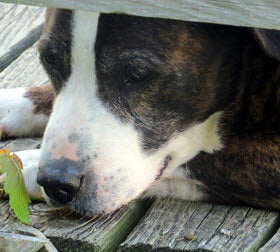We recognize when we have a “senior moment,” but do we overlook the signs in our dog? Maybe he forgets the route on your daily walk or doesn’t get excited about some of his favorite things. These cues may be signs of a dog’s version of Alzheimer’s disease called canine cognitive dysfunction (CCD).
An Overview of CCD
Most dogs develop some level of CCD as they grow old. Research at University of California, Davis indicates 28 percent of dogs aged 11-12 years and 68 percent of dogs aged 15-16 years show one or more signs of cognitive impairment. Yet many dog owners aren’t aware their dogs can suffer from CCD until they take them to the vet for what they think are physical or behavioral issues.
In most cases, CCD comes on gradually along with other conditions in their senior years. The tricky part is knowing which signs are related to CCD and which are due to age-related conditions such as arthritis, diabetes, cancer, kidney issues or hearing and sight loss. Your vet may suggest running some tests to help pinpoint the cause.
The widely accepted acronym “DISHA” refers to the symptoms associated with CCD:
- Disorientation
- (changed) Interactions with the family and other pets
- Sleep-wake change changes
- House soiling
- Activity level changes
The signs don’t coincide with a stage of cognitive dysfunction, but the more occurrence of the signs generally indicates the greater significance of the problem.
An In-Depth Look at DISHA Signs
Disorientation – Senior dogs may become disoriented when they’re in familiar surroundings. Your dog may wander off down the street for no reason or come to the wrong door to be let back in. Or at bedtime, you may find him in the laundry room instead of his clockwork habit of curling up in his bed. You’ll want to take him in for a check to make sure these aren’t signs of a brain tumor or other disease.
Interactions – If your very sociable dog starts to act irritable and growl at other dogs or children, it could be a sign that he is in pain or it may be related to CCD. They may also start to care less that the doorbell rang, jump up to greet visitors or not respond when their leash is in your hand … all signs of withdrawal from their favorite activities.
Sleep-Wake Cycle Changes – A more specific sign of CCD is a change in their sleep patterns. If they start to pace at night or reverse their normal schedules – night becomes day, day becomes night – your vet may be able to suggest medications which can restore their normal sleep cycles.
House Soiling – One of the most common signs of CCD is urinating or defecating in the house by a housetrained dog. Your dog may lose his ability to control eliminating, even when he knows he needs to go outside. Other causes could be a factor – bladder infection, kidney problems or diabetes. But if those are ruled out, then there is a good chance it could be due to CCD. Further into cognitive dysfunction, he may even lose the understanding that he should poop outside.
Activity Level – When he shows a decreased desire to explore, play with his favorite toy or respond to visitors or sounds around him, these may be signs of CCD. Some decrease in activity is normal in senior dogs, but if he has trouble finding his food bowl or dropped food this can be a sign of cognitive dysfunction. Repetitive motion, like walking a continual path around the island in your kitchen, is also a sign of CCD. Other signs of repetitive motion include head bobbing, leg shaking and excessive barking in a normally quiet dog.
Ways to Help Your Senior Dog
Seeing your dog decline into cognitive failure is an emotional and confusing time, but there are ways you can help ease his progression. Some of these suggestions may help it slow down from one issue into three issues:
- Add an omega-3 supplement to your dog's diet to help promote and strengthen cellular health.
- Introduce more play time and hide-and-seek puzzles to help stimulate their problem-solving stimulation.
- Food dispenser toys that require certain actions to get the food out keep them mentally active.
- Going back to the early days of their behavioral training – sit, stay, down – can be a way of reassuring and reinforcing their good behavior for something they may recall easily.
- More frequent visits to the dog park to give him more socialization experiences may keep him more physically and mentally active.
- Psychoactive drugs and calming or neurological supplements may help slow your dog’s decline.
- Regular checkups with your vet to go over a list of observations and questions will help your vet adjust your dog’s program and suggest new options along the cognitive decline.
Embrace it. Accept it. Love it. Adjust with it.
This blog is brought to you by Under the Weather®, provider of bland diet products for dogs. When your dog experiences occasional or temporary vomiting or diarrhea, be ready with our freeze-dried bland diets. No more cooking – just add boiling water! Made with 100% lean meats, vegetables and grains, all raised or grown in the U.S.A. Gluten free, no meat by-products, no artificial anything. Even picky pups love this product!
View Our Products
Visit Our Blog Library




